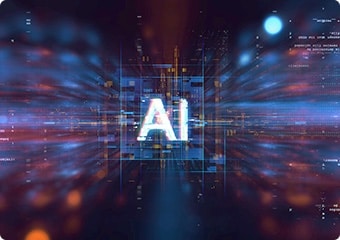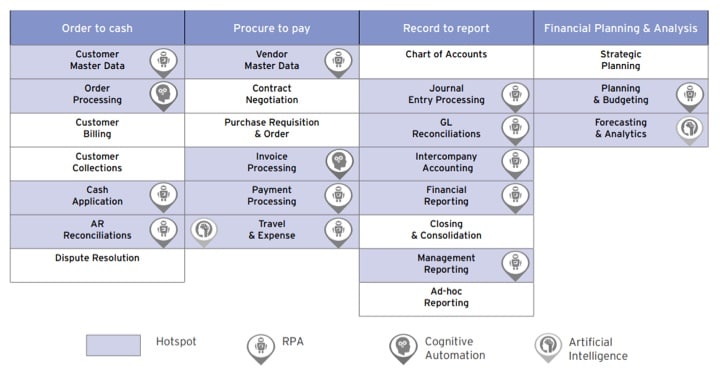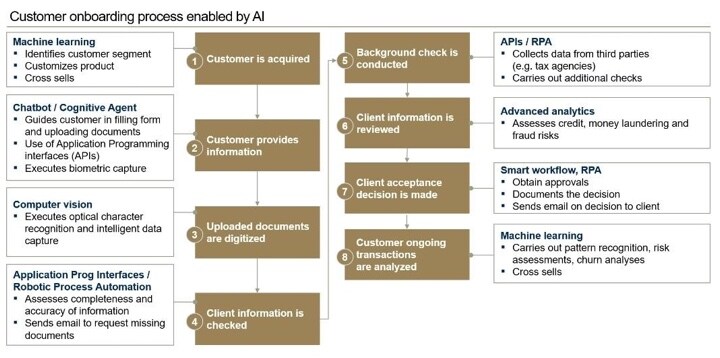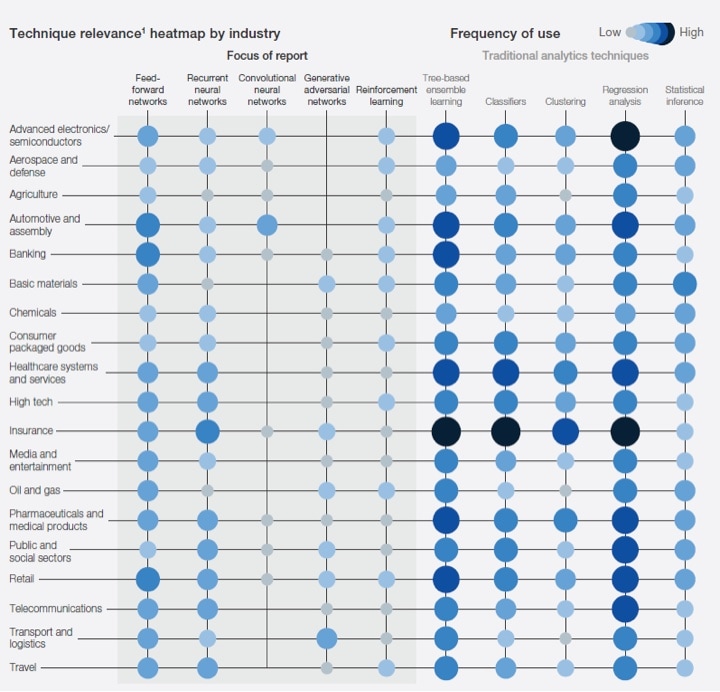

Summary
AI has evolved significantly into mainstream enterprise technology in the last few years. It is important for an enterprise to understand the possibilities they can achieve by leveraging the power of AI. Read this article to know about some of the top emerging use cases of AI in sectors like healthcare, finance, banking.
We have entered the time of the “Fourth Industrial Revolution,” where technology breakthroughs go beyond automation of production or digitization of information. Science is now advancing to the point where researchers can deconstruct and produce new forms of physical and biological matter at an atomic, molecular, and supramolecular scale.
Today, the boundaries between physical, digital, and biological worlds are blurring. Multiple emerging technologies, including Artificial Intelligence (AI), the Internet of Things (IoT), robotics, AI-enabled smart devices, nanotechnology, 3D printing, synthetic biology, and genetics are reaching their maturity.
Disruption has touched many industries in the past. However, with the exponential nature of technology advancements, the pace of change is continuously accelerating, and disruption will penetrate almost every industry in the coming decade. New technologies are changing the playground and rules of competition across industries, creating significant new business opportunities. Indisputably, businesses that aggressively innovate also thrive in these times of the digital revolution.
Digital technologies are disrupting existing products, processes, and business models, profoundly impacting and transforming businesses across the globe, thereby redefining competition and blurring sector boundaries.
As more organizations embark on systematic, data-driven, end-to-end digital transformation journeys, their leadership needs are fast evolving. Unless organizations create a true transformation vision, they will remain vulnerable to disruption. Building a sustainable response environment internally aids firms in developing innovative solutions, a key ingredient to gain a competitive advantage.
Implementing all-digital platforms is now the name of the game, enabling organizations to dramatically transform their operating models to improve the customer experience, increase successful business outcomes, and stay ahead of the curve.

Artificial Intelligence — Powering a new generation of possibilities
AI mimics human intelligence. It uses algorithms, which are built to function similar to human brains to solve complex problems. Developing these solutions requires a huge amount of data and significant computational power, in addition to the expertise needed to codify the problem statement and train the bot. Therefore, they are typically complex to develop, although many AI solutions can be procured “pre-trained” and integrated with other automation tools.
AI Use Cases — Shaping the future of businesses
AI/ ML tools and techniques help organizations detect project risks faster, perform what-if analysis much wider and deeper and make recommendations for corrective actions in a much more impactful manner than ever before. Moreover, cognitive technologies help managers get deeper and faster insights into staff performance and customer satisfaction, thus proactively supporting them in areas where they might need help.
-
AI meets healthcare services
AI is poised to play an increasingly prominent role in medicine and healthcare because of advances in computing power, learning algorithms, and the availability of large datasets sourced from medical records and wearable health monitors.The rise of AI in the era of big data can help physicians improve the quality of patient care and provide radiologists with tools for improving the accuracy and efficiency of diagnosis and treatment.Experts predict AI to significantly impact diverse areas of healthcare, such as chronic disease management and clinical decision making. While still in the early stages of adoption, AI algorithms are showing promise in specializations such as radiology, pathology, ophthalmology, and cardiology. The avalanche of medical data in the form of clinical, genomic, and imaging data is only likely to accelerate as precision and personalize health care. For further more information, refer to the article, How AI is improving efficiency and accuracy of medical diagnostics and treatment, reducing cost of health care and expanding clinical capacity.iAI will support the future needs of health care by analyzing the vast amounts and various forms of data that patients and healthcare institutions record at every moment. It’s likely to support and augment physicians by taking away the routine parts of a physician’s work and enabling them to spend more precious time on more complex healthcare cases
-
AI in finance function
There are many automation opportunities in the finance function due to its relatively high proportion of rules-based processes in comparison with other business functions. Some of the key opportunities, where the benefits are typically highest, are illustrated in the figure below.

Figure 1: AI use cases in finance function
Source: Optimizing the opportunities of AI in Digital Transformation, 2019ii
-
AI in client onboarding function
Traditionally, onboarding clients in banking was very manual, often taking several days before providing clients with an acceptance or a rejection of their case. This end-to-end process is complex to automate, as it combines a large amount of diverse capabilities: reading, checking, analyzing, summarizing, and decision making.

Figure 2: AI use cases in client onboarding
Source: Optimizing the opportunities of AI in Digital Transformation, 2019iii
As a result of a combination of technology, the process becomes automated. It can now be performed in significantly reduced time, providing higher customer and employee experiences, reducing costs by more than 80%, and significantly increasing compliance.
-
AI in customer service function
The use of AI in the front-line customer service engagement provides considerable opportunity to improve service level and differentiate the offerings 24/7, resulting in increased customer satisfaction. An emerging technology that will rewrite the rule book for customer service is the clever use of digital humans created through advance application of AI.McKinsey in the paper, Driving impact at scale from automation and AIiv, 2019 collated and analyzed more than 400 use cases across 19 industries and nine business functions. This provided insight into the areas within specific sectors where deep neural networks can potentially create the most value.

Figure 3: AI techniques can be applied alongside traditional analytics across industries
Source: Driving impact at scale from automation and AI, McKinsey, 2019v
In the same report, they estimated that AI has the potential to create between $3.5 trillion and $5.8 trillion in global value annually across nine business functions in 19 industries. This constitutes about 40 percent of the overall $9.5 trillion to $15.4 trillion annual impact that could potentially be enabled by all analytical techniques.vi
Loved what you read?
Get 15 practical thought leadership articles on AI and Automation delivered to your inbox


Loved what you read?
Get 15 practical thought leadership articles on AI and Automation delivered to your inbox
Conclusion
Automation, leveraging AI and other technologies, has opened up new possibilities. The pace of adoption has been rapid. Institutions of all sizes globally are leveraging automation to drive value. AI, a transformational technology of our digital age—and its practical application throughout the economy, is growing apace. It’s attracting considerable corporate investment, and as the technologies develop, the potential value that can be unlocked will grow exponentially.
DISCLAIMER
Any opinions, findings, and conclusions or recommendations expressed in this material are those of the author(s) and do not necessarily reflect the views of the respective institutions where the authors work or funding agencies
References:
- i https://www.linkedin.com/pulse/how-ai-improving-efficiency-accuracy-medical-reducing-mike-khan-cpa/
- ii, iii https://www.linkedin.com/pulse/optimising-opportunities-ai-digital-transformation-mike-khan-cpa/
- iv, v, vi https://www.mckinsey.com/~/media/McKinsey/Business%20Functions/McKinsey%20Digital/Our%20Insights/Driving%20impact%20at%20scale%20from%20automation%20and%20AI/Driving-impact-at-scale-from-automation-and-AI.ashx





